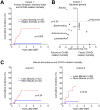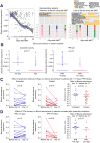Intestinal Blautia Is Associated with Reduced Death from Graft-versus-Host Disease
- PMID: 25977230
- PMCID: PMC4516127
- DOI: 10.1016/j.bbmt.2015.04.016
Intestinal Blautia Is Associated with Reduced Death from Graft-versus-Host Disease
Abstract
The relationship between intestinal microbiota composition and acute graft-versus-host disease (GVHD) after allogeneic blood/marrow transplantation (allo-BMT) is not well understood. Intestinal bacteria have long been thought to contribute to GVHD pathophysiology, but recent animal studies in nontransplant settings have found that anti-inflammatory effects are mediated by certain subpopulations of intestinal commensals. Hypothesizing that a more nuanced relationship may exist between the intestinal bacteria and GVHD, we evaluated the fecal bacterial composition of 64 patients 12 days after BMT. We found that increased bacterial diversity was associated with reduced GVHD-related mortality. Furthermore, harboring increased amounts of bacteria belonging to the genus Blautia was associated with reduced GVHD lethality in this cohort and was confirmed in another independent cohort of 51 patients from the same institution. Blautia abundance was also associated with improved overall survival. We evaluated the abundance of Blautia with respect to clinical factors and found that loss of Blautia was associated with treatment with antibiotics that inhibit anaerobic bacteria and receiving total parenteral nutrition for longer durations. We conclude that increased abundance of commensal bacteria belonging to the Blautia genus is associated with reduced lethal GVHD and improved overall survival.
Keywords: Graft-versus-host disease; Intestinal bacteria.
Copyright © 2015 American Society for Blood and Marrow Transplantation. Published by Elsevier Inc. All rights reserved.
Figures




References
-
- Pasquini MC, W Z. Current use and outcome of hematopoietic stem cell transplantation. CIBMTR Summary Slides. 2013 Available at: http://www.cibmtr.org.
-
- Jones JM, Wilson R, Bealmear PM. Mortality and gross pathology of secondary disease in germfree mouse radiation chimeras. Radiat Res. 1971;45:577–88. - PubMed
-
- van Bekkum DW, Roodenburg J, Heidt PJ, van der Waaij D. Mitigation of secondary disease of allogeneic mouse radiation chimeras by modification of the intestinal microflora. J Natl Cancer Inst. 1974;52:401–4. - PubMed
-
- Storb R, Prentice RL, Buckner CD, Clift RA, Appelbaum F, Deeg J, et al. Graft-versus-host disease and survival in patients with aplastic anemia treated by marrow grafts from HLA-identical siblings. Beneficial effect of a protective environment. N Engl J Med. 1983;308:302–7. - PubMed
-
- Vossen JM, Heidt PJ, van den Berg H, Gerritsen EJ, Hermans J, Dooren LJ. Prevention of infection and graft-versus-host disease by suppression of intestinal microflora in children treated with allogeneic bone marrow transplantation. Eur J Clin Microbiol Infect Dis. 1990;9:14–23. - PubMed
Publication types
MeSH terms
Grants and funding
- R01 AI101406/AI/NIAID NIH HHS/United States
- R25 CA020449/CA/NCI NIH HHS/United States
- P01-CA023766/CA/NCI NIH HHS/United States
- T32 CA009207/CA/NCI NIH HHS/United States
- R01-AI095706/AI/NIAID NIH HHS/United States
- R01-HL069929/HL/NHLBI NIH HHS/United States
- R01-AI042135/AI/NIAID NIH HHS/United States
- R01 AI100288/AI/NIAID NIH HHS/United States
- P30-CA008748/CA/NCI NIH HHS/United States
- R01 AI042135/AI/NIAID NIH HHS/United States
- R01-AI101406/AI/NIAID NIH HHS/United States
- R01-AI080455/AI/NIAID NIH HHS/United States
- HHSN272200900059C/AI/NIAID NIH HHS/United States
- R01 HL069929/HL/NHLBI NIH HHS/United States
- P30 CA072720/CA/NCI NIH HHS/United States
- K23-AI095398/AI/NIAID NIH HHS/United States
- P01 CA023766/CA/NCI NIH HHS/United States
- K23 AI095398/AI/NIAID NIH HHS/United States
- R01 AI080455/AI/NIAID NIH HHS/United States
- P30 CA008748/CA/NCI NIH HHS/United States
- R01 AI095706/AI/NIAID NIH HHS/United States
LinkOut - more resources
Full Text Sources
Other Literature Sources
Medical

